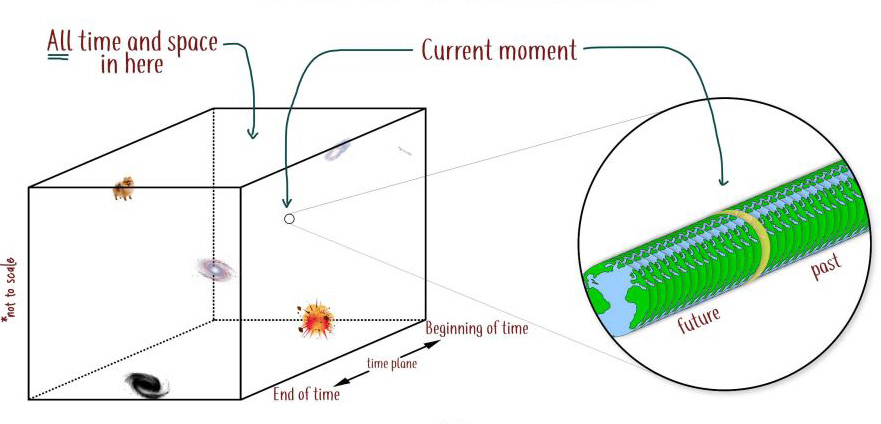This post is also available in Dutch .
What is Time?
Einstein’s Theory of General Relativity at its core tells us that space and time are fundamentally intertwined. According to it, objects affect the curvature of space-time, based on their mass thus also affecting the passage of time. This is something we need to let sink in –time moves differently depending on where you are and how fast you’re moving. Taken further, the theory suggests that we exist in a ‘block universe’ in which the three dimensions of space and the fourth dimension of time create a cube in which past, present and future all exist as equally real parts without any flow of time, as depicted in Figure 1.

Modern physics challenges our conventional understanding of time, as the mathematical laws of nature (general relativity, classical mechanics, quantum mechanics etc.) also show no preference for time’s direction.
So, where does our perception of the flow of time come from?
The Arrow of Time
One clue along the way is the measure of entropy. In simple terms, it describes that a system will always tend towards greater chaos over time as suggested by the second law of thermodynamics. This would give us an objective timeline in which a system evolves from a more ordered state to disorder. However, Boltzmann (1872) recognized that entropy is not a fundamental property but instead a probabilistic description. Consider an ice cube in water: the system comprises a finite number of molecules in the glass. While there are limited configurations resembling the original state (ice and water), there are far more where the ice has melted and the water molecules are mixed. This view suggests that finding the ice cube in the water a year later is not impossible, but highly improbable. Entropy thus describes the likelihood of a system’s state rather than serving as an objective arrow of time.
Your Brain is a Time Machine
Entering a world without objective time seems counterintuitive. Is there not a universal clock that steadily counts the seconds forward? Saint Augustine, theologian and philosopher (354 AD – 430 AD), also ruminated on the nature of time and came to this conclusion:
“It is within my mind then that I measure time. I must not allow my mind to insist that time is something objective. When I measure time, I am measuring something in the present of my mind. Either this is time, or I have no idea what time is.” (Saint Augustine, Confessions)
This is also where current neuroscience leads us: It is in our brains that the perception of the passage of time is created – we are time machines.
Our brains develop within the macroscopic (everyday) world where a distinct time orientation towards higher entropy emerges. Formed through evolution, our brains pick up on these traces of the past to form memories. These memories serve a vital role in our survival, aiding in the prediction of future events and guiding our behaviour. It is hypothesized that this prediction mechanism depends on a probability distribution. In the brain, the distribution is refined through past experiences, which reflects the likelihood of future events and is compared to incoming sensory data in the present moment. Through this process, we might perceive the illusion of an objective flow of time.
(If you want to know more about the specifics of how your brain keeps track of time, have a look at our previous article.)
So, after modern physics challenges our understanding of time, we return to our subjective experience of time. But now we can recognize the hidden intricacies, like observing a snowflake up close. Nevertheless, time will remain an enduring mystery. Delving into its complexities leaves me with a profound sense of awe and humility in the face of the vast unknown. I hope it did the same for you.
Article inspired by the books “Your Brain is a Time Machine” (Buonomano) and “The Order of Time” (Rovelli).
Credits
Author: Swantje
Buddy: Siddharth
Editor: Vivek
Translation: Lucas
Editor translation: Maartje
